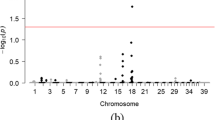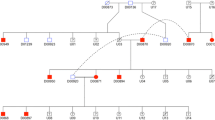Abstract
Addison’s disease (AD) is a life-threatening endocrine disorder that occurs spontaneously in both humans and dogs. Associations between MHC class II genes and AD have been shown in several human studies. Our goal was to identify MHC class II associations with AD in a large population of Standard Poodles, a breed highly predisposed to AD. We sequenced exon 2 of the class II genes DLA-DRB1, DLA-DQA1, and DLA-DQB1 in 110 affected and 101 unaffected Standard Poodles and tested for association with AD. After correcting for population structure, two haplotypes were found to confer risk of developing AD in a sex-specific manner: DLA-DRB1*015:01-DQA1*006:01-DQB1*023:01 in males (x2p = 0.03, OR 2.1) and DLA-DRB1*009:01-DQA1*001:01-DQB1*008:01:1 in females (x2p = 0.02, OR 8.43). Sex-specific associations have been previously described in human populations, but this is the first report of this kind in dogs. Consistent with findings in other studies, we found the DLA-DQA1*006:01 allele (x2p = 0.04) to be associated with AD in males independent of haplotype. In females, the haplotype DLA-DRB1*009:01-DQA1*001:01-DQB1*008:01:1 confers a very high risk for developing AD, although its frequency was rare (9 of 124 females) in our study population. Further studies are warranted to validate the findings of this exploratory dataset and to assess the usefulness of this haplotype as a risk marker for AD in female Standard Poodles. Our results highlight the importance of evaluating MHC class II disease associations in large populations, and accounting for both biological sex and population structure.

Similar content being viewed by others
References
Behrens M, Trejo T, Luthra H, Griffiths M, David CS, Taneja V (2010) Mechanism by which HLA-DR4 regulates sex-bias of arthritis in humanized mice. J Autoimmun 35(1):1–9. https://doi.org/10.1016/J.JAUT.2009.12.007
Betterle C, Scarpa R, Garelli S, Morlin L, Lazzarotto F, Presotto F, Coco G, Masiero S, Parolo A, Albergoni MP, Favero R, Barollo S, Salvà M, Basso D, Chen S, Rees Smith B, Furmaniak J, Mantero F (2013) Addison’s disease: a survey on 633 patients in Padova. Eur J Endocrinol 169(6):773–784. https://doi.org/10.1530/EJE-13-0528
Bilbao JR, Martín-Pagola A, De Nanclares GP, Calvo B, Vitoria JC, Vázquez F, Castaño L (2003) HLA-DRB1 and MICA in autoimmunity: common associated alleles in autoimmune disorders. Ann N Y Acad Sci 1005(November):314–318. http://www.ncbi.nlm.nih.gov/pubmed/14679082. Accessed 10 July 2018
Boag AM, Christie MR, McLaughlin KA, Syme HM, Graham P, Catchpole B (2015) Autoantibodies against cytochrome P450 side-chain cleavage enzyme in dogs (Canis lupus familiaris) affected with hypoadrenocorticism (Addison’s disease). Edited by Jan S Suchodolski. PLoS One 10(11):e0143458. https://doi.org/10.1371/journal.pone.0143458
Bodis G, Toth V, Schwarting A (2018) Role of human leukocyte antigens (HLA) in autoimmune diseases. Rheumatol Ther 5(1):5–20. https://doi.org/10.1007/s40744-018-0100-z
Bratland E, Husebye ES (2011) Cellular immunity and immunopathology in autoimmune Addison’s disease. Mol Cell Endocrinol 336(1–2):180–190. https://doi.org/10.1016/j.mce.2010.12.015
Burton S, DeLay J, Holmes A, Somerville C, Eye J, Shaw D, Wack O, Hanna P (1997) Hypoadrenocorticism in young related Nova Scotia duck tolling retrievers. Can Vet J 38(4):231–234. http://www.ncbi.nlm.nih.gov/pubmed/9105722. Accessed 12 July 2018
Cavan DA, Penny MA, Jacobs KH, Kelly MA, Jenkins D, Mijovic C, Chow C, Cockram CS, Hawkins BR, Barnett AH (1994) The HLA association with Graves’ disease is sex-specific in Hong Kong Chinese subjects. Clin Endocrinol 40(1):63–66. https://doi.org/10.1111/j.1365-2265.1994.tb02444.x
Celius EG, Harbo HF, Egeland T, Vartdal F, Vandvik B, Spurkiand A (2000) Sex and age at diagnosis are correlated with the HLA-DR2, DQ6 haplotype in multiple sclerosis. J Neurol Sci 178(2):132–13. http://www.ncbi.nlm.nih.gov/pubmed/11018705. Accessed 19 Sep 2018
Chase K, Sargan D, Miller K, Ostrander EA, Lark KG (2006) “Understanding the genetics of autoimmune disease: two loci that regulate late onset Addison’s disease in Portuguese water dogs.” Int J Immunogenet. https://doi.org/10.1111/j.1744-313X.2006.00593.x
Czaja AJ, Donaldson PT (2002) Gender effects and synergisms with histocompatibility leukocyte antigens in type 1 autoimmune hepatitis. Am J Gastroenterol 97(8):2051–2057. https://doi.org/10.1111/j.1572-0241.2002.05921.x
Dai R, Ahmed SA (2014) Therapeutics and clinical risk management dovepress sexual dimorphism of MiRNA expression: a new perspective in understanding the sex bias of autoimmune diseases. Ther Clin Risk Manag, 10–151. https://doi.org/10.2147/TCRM.S33517
Dawoodji A, Chen J-L, Shepherd D, Dalin F, Tarlton A, Alimohammadi M, Penna-Martinez M, Meyer G, Mitchell AL, Gan EH, Bratland E, Bensing S, Husebye ES, Pearce SH, Badenhoop K, Kämpe O, Cerundolo V (2014) High frequency of cytolytic 21-hydroxylase specific CD8 + T cells in autoimmune Addison’s disease patients 1 Europe PMC funders group adrenal failure and ultimately a potential target for therapeutic intervention and induction of immunity against adrenal cortex cancer. J Immunol 193(5):2118–2126. https://doi.org/10.4049/jimmunol.1400056
Dragin N, Bismuth J, Cizeron-Clairac G, Biferi MG, Berthault C, Serraf A, Nottin R, Klatzmann D, Cumano A, Barkats M, le Panse R, Berrih-Aknin S (2016) Estrogen-mediated downregulation of AIRE influences sexual dimorphism in autoimmune diseases. J Clin Invest 126(4):1525–1537. https://doi.org/10.1172/JCI81894
Duquette P, Pleines J, Girard M, Charest L, Senecal-Quevillon M, Masse C (1992) The increased susceptibility of women to multiple sclerosis. Can J Neurol Sci. 19(4):466–471. http://www.ncbi.nlm.nih.gov/pubmed/1423044. Accessed 19 Sep 2018
Erichsen MM, Løvås K, Skinningsrud B, Wolff AB, Undlien DE, Svartberg J, Fougner KJ, Berg TJ, Bollerslev J, Mella B, Carlson JA, Erlich H, Husebye ES (2009) Clinical, immunological, and genetic features of autoimmune primary adrenal insufficiency: observations from a Norwegian registry. J Clin Endocrinol Metab 94(12):4882–4890. https://doi.org/10.1210/jc.2009-1368
Evans JM, Tsai KL, Starr-Moss AN, Steiner JM, Clark LA (2015) Association of DLA-DQB1 alleles with exocrine pancreatic insufficiency in Pembroke Welsh Corgis. Anim Genet 46(4):462–465. https://doi.org/10.1111/age.12317
Evans JM, Noorai RE, Tsai KL, Starr-Moss AN, Hill CM, Anderson KJ, Famula TR, Clark LA (2017) “Beyond the MHC: a canine model of dermatomyositis shows a complex pattern of genetic risk involving novel loci.” Edited by Gregory S. Barsh. PLoS Genet 13 (2): e1006604. https://doi.org/10.1371/journal.pgen.1006604
Falorni A, Brozzetti A, La Torre D, Tortoioli C, Gambelunghe G (2008) Association of genetic polymorphisms and autoimmune Addison’s disease. Expert Rev Clin Immunol 4(4):441–456. https://doi.org/10.1586/1744666X.4.4.441
Falorni A, Brozzetti A, Perniola R (2016) From genetic predisposition to molecular mechanisms of autoimmune primary adrenal insufficiency. Front Horm Res 46:115–132. https://doi.org/10.1159/000443871
Famula TR, Belanger JM, Oberbauer AM (2003) Heritability and complex segregation analysis of hypoadrenocorticism in the Standard Poodle. J Small Anim Pract 44(1):8–12. https://doi.org/10.1111/j.1748-5827.2003.tb00096.x
Frank CB, Valentin SY, Scott-Moncrieff JCR, Miller MA (2013) Correlation of inflammation with adrenocortical atrophy in canine adrenalitis. J Comp Pathol 149(2–3):268–279. https://doi.org/10.1016/J.JCPA.2012.11.242
Freeman M, Weetman AP (1992) T and B cell reactivity to adrenal antigens in autoimmune Addison’s disease. Clin Exp Immunol 88(2):275–279 http://www.ncbi.nlm.nih.gov/pubmed/1572092
Friedenberg SG, Lunn KF, Meurs KM (2017) Evaluation of the genetic basis of primary hypoadrenocorticism in standard poodles using SNP Array genotyping and whole-genome sequencing. Mamm Genome 28(1–2):56–65. https://doi.org/10.1007/s00335-016-9671-6
Friedenberg SG, Brown DL, Meurs KM, Law JMH (2018) Lymphocyte subsets in the adrenal glands of dogs with primary hypoadrenocorticism. Vet Pathol 55(1):177–181. https://doi.org/10.1177/0300985816684914
Gabory A, Attig L, Junien C (2009) Sexual dimorphism in environmental epigenetic programming. Mol Cell Endocrinol 304(1–2):8–18. https://doi.org/10.1016/j.mce.2009.02.015
Gold AJ, Langlois DK, Refsal KR (2016) Evaluation of basal serum or plasma cortisol concentrations for the diagnosis of hypoadrenocorticism in dogs. J Vet Intern Med 30(6):1798–1805. https://doi.org/10.1111/jvim.14589
Gombos Z, Hermann R, Kiviniemi M, Nejentsev S, Reimand K, Fadeyev V, Peterson P, Uibo R, Ilonen J (2007) Analysis of extended human leukocyte antigen haplotype association with Addison’s disease in three populations. Eur J Endocrinol 157(6):757–761. https://doi.org/10.1530/EJE-07-0290
Greco DS (2007) Hypoadrenocorticism in small animals. Clin Tech Small Anim Pract 22(1):32–35. https://doi.org/10.1053/j.ctsap.2007.02.005
Hanson JM, Tengvall K, Bonnett BN, Hedhammar Å (2016) Naturally occurring adrenocortical insufficiency--an epidemiological study based on a Swedish-insured dog population of 525,028 dogs. J Vet Intern Med 30(1):76–84. https://doi.org/10.1111/jvim.13815
Haynes BF, Heinly CS (1995) Early human T cell development: analysis of the human thymus at the time of initial entry of hematopoietic stem cells into the fetal thymic microenvironment. J Exp Med 181(4):1445–1458. http://www.ncbi.nlm.nih.gov/pubmed/7699329. Accessed 23 Sep 2018
Hughes AM, Jokinen P, Bannasch DL, Lohi H, Oberbauer AM (2010) Association of a dog leukocyte antigen class II haplotype with hypoadrenocorticism in Nova Scotia Duck Tolling Retrievers. Tissue Antigens 75(6):684–690. https://doi.org/10.1111/j.1399-0039.2010.01440.x
Hughes T, Adler A, Merrill JT, Kelly JA, Kaufman KM, Williams A, Langefeld CD, Gilkeson GS, Sanchez E, Martin J, Boackle SA, Stevens AM, Alarcón GS, Niewold TB, Brown EE, Kimberly RP, Edberg JC, Ramsey-Goldman R, Petri M, Reveille JD, Criswell LA, Vilá LM, Jacob CO, Gaffney PM, Moser KL, Vyse TJ, Alarcón-Riquelme ME, James JA, Tsao BP, Scofield RH, Harley JB, Richardson BC, Sawalha AH (2012) Analysis of autosomal genes reveals gene-sex interactions and higher total genetic risk in men with systemic lupus erythematosus. Ann Rheum Dis 71(5):694–699. https://doi.org/10.1136/annrheumdis-2011-200385
Husebye E, Løvås K (2009) Pathogenesis of primary adrenal insufficiency. Best Pract Res Clin Endocrinol Metab 23(2):147–157. https://doi.org/10.1016/j.beem.2008.09.004
Irizar H, Muñoz-Culla M, Zuriarrain O, Goyenechea E, Castillo-Triviño T, Prada A, Saenz-Cuesta M, de Juan D, Lopez de Munain A, Olascoaga J, Otaegui D (2012) HLA-DRB1*15:01 and multiple sclerosis: a female association? Mult Scler J 18(5):569–577. https://doi.org/10.1177/1352458511426813
Jerne NK (1971) The somatic generation of immune recognition. Eur J Immunol 1(1):1–9. https://doi.org/10.1002/eji.1830010102
Kennedy LJ, Davison LJ, Barnes A, Short AD, Fretwell N, Jones CA, Lee AC, Ollier WER, Catchpole B (2006) Identification of susceptibility and protective major histocompatibility complex haplotypes in canine diabetes mellitus. Tissue Antigens 68(6):467–476. https://doi.org/10.1111/j.1399-0039.2006.00716.x
Krovi SH, Gapin L (2016) Revealing the TCR Bias for MHC molecules. Proc Natl Acad Sci U S A 113(11):2809–2811. https://doi.org/10.1073/pnas.1601511113
Liu K, Kurien BT, Zimmerman SL, Kaufman KM, Taft DH, Kottyan LC, Lazaro S, Weaver CA, Ice JA, Adler AJ, Chodosh J, Radfar L, Rasmussen A, Stone DU, Lewis DM, Li S, Koelsch KA, Igoe A, Talsania M, Kumar J, Maier-Moore JS, Harris VM, Gopalakrishnan R, Jonsson R, Lessard JA, Lu X, Gottenberg J-E, Anaya J-M, Cunninghame-Graham DS, Huang AJW, Brennan MT, Hughes P, Illei GG, Miceli-Richard C, Keystone EC, Bykerk VP, Hirschfield G, Xie G, Ng W-F, Nordmark G, Eriksson P, Omdal R, Rhodus NL, Rischmueller M, Rohrer M, Segal BM, Vyse TJ, Wahren-Herlenius M, Witte T, Pons-Estel B, Alarcon-Riquelme ME, Guthridge JM, James JA, Lessard CJ, Kelly JA, Thompson SD, Gaffney PM, Montgomery CG, Edberg JC, Kimberly RP, Alarcón GS, Langefeld CL, Gilkeson GS, Kamen DL, Tsao BP, Joseph McCune W, Salmon JE, Merrill JT, Weisman MH, Wallace DJ, Utset TO, Bottinger EP, Amos CI, Siminovitch KA, Mariette X, Sivils KL, Harley JB, Hal Scofield R (2015) “X chromosome dose and sex bias in autoimmune diseases: increased 47, XXX in systemic lupus erythematosus and Sjögren’s syndrome.” Arthritis Rheumatol. https://doi.org/10.1002/art.39560
Massey J, Boag A, Short AD, Scholey RA, Henthorn PS, Littman MP, Husebye E, Catchpole B, Pedersen N, Mellersh CS, Ollier WER, Kennedy LJ (2013) MHC class II association study in eight breeds of dog with hypoadrenocorticism. Immunogenetics 65(4):291–297. https://doi.org/10.1007/s00251-013-0680-2
McCombe PA, Csurhes PA, Greer JM (2006) Studies of HLA associations in male and female patients with Guillain–Barré syndrome (GBS) and chronic inflammatory demyelinating polyradiculoneuropathy (CIDP). J Neuroimmunol 180(1–2):172–177. https://doi.org/10.1016/J.JNEUROIM.2006.07.017
Mitchell AL, Pearce SHS (2012) Autoimmune Addison disease: pathophysiology and genetic complexity. Nat Rev Endocrinol 8(5):306–316. https://doi.org/10.1038/nrendo.2011.245
Moutsianas L, Gutierrez-Achury J (2018) “Genetic association in the HLA region.”. In Methods in molecular biology (Clifton, N.J.), 1793:111–34. https://doi.org/10.1007/978-1-4939-7868-7_8
Murphy K, Weaver C (2017) Janeway’s immunobiology, 9th edn. Garland Science, New York and London
Oberbauer AM, Benemann KS, Belanger JM, Wagner DR, Ward JH, Famula TR (2002) Inheritance of hypoadrenocorticism in bearded collies. Am J Vet Res 63(5):643–647. http://www.ncbi.nlm.nih.gov/pubmed/12013462. Accessed 10 July 2018
Oberbauer AM, Bell JS, Belanger JM, Famula TR (2006) Genetic evaluation of Addison’s disease in the Portuguese water dog. BMC Vet Res 2(1):15. https://doi.org/10.1186/1746-6148-2-15
Ortona E, Pierdominici M, Maselli A, Veroni C, Aloisi F, Shoenfeld Y (2016) Monographic section sex-based differences in autoimmune diseases. Ann Ist Super Sanità 52(2):205–212. https://doi.org/10.4415/ANN_16_02_12
Pazderska A, Pearce SH, Mitchell AL (2018) Autoimmune Addison’s disease: genetic aetiology and pathophysiology. In: Adrenal Disorders. Springer International Publishing, Cham, pp 85–108. https://doi.org/10.1007/978-3-319-62470-9_4
Pedersen NC, Brucker L, Tessier NG, Liu H, Penedo MCT, Hughes S, Oberbauer A, Sacks B (2015) “The effect of genetic bottlenecks and inbreeding on the incidence of two major autoimmune diseases in Standard Poodles, sebaceous adenitis and Addison’s disease.” https://doi.org/10.1186/s40575-015-0026-5
Perneger TV (1998) What’s wrong with Bonferroni adjustments. BMJ 316(7139):1236–1238. https://doi.org/10.1136/BMJ.316.7139.1236
Perniola R (2018) Twenty years of AIRE. Front Immunol 9:98. https://doi.org/10.3389/fimmu.2018.00098
Purcell S, Neale B, Todd-Brown K, Thomas L, Ferreira MAR, Bender D, Maller J, Sklar P, de Bakker PIW, Daly MJ, Sham PC (2007) PLINK: A tool set for whole-genome association and population-based linkage analyses. Am J Hum Genet 81(3):559–575. https://doi.org/10.1086/519795
Rothman KJ (1990) No adjustments are needed for multiple comparisons. Epidemiology (Cambridge, Mass) 1(1):43–46. http://www.ncbi.nlm.nih.gov/pubmed/2081237. Accessed 15 Feb 2019
Rottembourg D, Deal C, Lambert M, Mallone R, Carel J-C, Lacroix A, Caillat-Zucman S, le Deist F (2010) 21-hydroxylase epitopes are targeted by CD8 T cells in autoimmune Addison’s disease. J Autoimmun 35(4):309–315. https://doi.org/10.1016/j.jaut.2010.07.001
Safra N, Pedersen NC, Wolf Z, Johnson EG, Liu HW, Hughes AM, Young A, Bannasch DL (2011) Expanded dog leukocyte antigen (DLA) single nucleotide polymorphism (SNP) genotyping reveals spurious class II associations. Vet J 189(2):220–226. https://doi.org/10.1016/j.tvjl.2011.06.023
Schneider-Hohendorf T, Görlich D, Savola P, Kelkka T, Mustjoki S, Gross CC, Owens GC, Klotz L, Dornmair K, Wiendl H, Schwab N (2018) Sex Bias in MHC I-associated shaping of the adaptive immune system. Proc Natl Acad Sci U S A 115(9):2168–2173. https://doi.org/10.1073/pnas.1716146115
Shiel RE, Kennedy LJ, Nolan CM, Mooney CT, Callanan JJ (2014) Major histocompatibility complex class II alleles and haplotypes associated with non-suppurative meningoencephalitis in greyhounds. Tissue Antigens 84(3):271–276. https://doi.org/10.1111/tan.12365
Short AD, Boag A, Catchpole B, Kennedy LJ, Massey J, Rothwell S, Husebye E, Ollier B (2013) A candidate gene analysis of canine hypoadrenocorticism in 3 dog breeds. J Hered 104(6):807–820. https://doi.org/10.1093/jhered/est051
Short AD, Catchpole B, Boag AM, Kennedy LJ, Massey J, Rothwell S, Henthorn PS, Littman MP, Husebye E, Ollier B (2014) Putative candidate genes for canine hypoadrenocorticism (Addison’s disease) in multiple dog breeds. Vet Rec 175(17):430–430. https://doi.org/10.1136/vr.102160
Skinningsrud B, Lie BA, Lavant E, Carlson JA, Erlich H, Akselsen HE, Gervin K, Wolff AB, Erichsen MM, Løvås K, Husebye ES, Undlien DE (2011) Multiple loci in the HLA complex are associated with Addison’s disease. J Clin Endocrinol Metab 96(10):E1703–E1708. https://doi.org/10.1210/jc.2011-0645
Skov J, Höijer J, Magnusson PKE, Ludvigsson JF, Kämpe O, Bensing S (2017) Heritability of Addison’s disease and prevalence of associated autoimmunity in a cohort of 112,100 Swedish twins. Endocrine 58(3):521–527. https://doi.org/10.1007/s12020-017-1441-z
Taneja V, Behrens M, Mangalam A, Griffiths MM, Luthra HS, David CS (2007) New humanized HLA-DR4-transgenic mice that mimic the sex bias of rheumatoid arthritis. Arthritis Rhematol 56(1):69–78. https://doi.org/10.1002/art.22213
Team, R Core (2013) “No title.” Vienna, Austria: R Foundation for Statistical Computing
Van Lanen K, Sande A (2014) Canine hypoadrenocorticism: pathogenesis, diagnosis, and treatment. Top Companion Anim Med 29(4):88–95. https://doi.org/10.1053/j.tcam.2014.10.001
Yu L, Brewer KW, Gates S, A W, Wang T, Babu SR, Gottlieb PA et al (1999) DRB1*04 and DQ alleles: expression of 21-hydroxylase autoantibodies and risk of progression to Addison’s disease. J Clin Endocrinol Metab 84(1):328–335. https://doi.org/10.1210/jcem.84.1.5414
Zhu M-L, Bakhru P, Conley B, Nelson JS, Free M, Martin A, Starmer J, Wilson EM, Su MA (2016) Sex bias in CNS autoimmune disease mediated by androgen control of autoimmune regulator. Nat Commun 7(April):11350. https://doi.org/10.1038/ncomms11350
Acknowledgements
Dr. Lorna Kennedy graciously provided us with a database of known canine MHC class II alleles.
Funding
This study was funded, in part, by a grant from the Poodle Club of America Foundation.
Author information
Authors and Affiliations
Corresponding author
Ethics declarations
Conflict of interest
The authors declare that they have no conflict of interest.
Ethical approval
Blood samples were collected at the University of Minnesota and North Carolina State University. All applicable international, national, and/or institutional guidelines for the care and use of animals were followed. All procedures performed in studies involving animals were in accordance with the ethical standards of the institution or practice at which the studies were conducted.
Informed consent
Signed consent forms, approved by each institution’s Institutional Animal Care and Use Committee, were collected from the owners of each study participant as part of the enrollment process.
Additional information
Publisher’s note
Springer Nature remains neutral with regard to jurisdictional claims in published maps and institutional affiliations.
Electronic supplementary material
ESM 1
(DOCX 45 kb)
Rights and permissions
About this article
Cite this article
Treeful, A.E., Rendahl, A.K. & Friedenberg, S.G. DLA class II haplotypes show sex-specific associations with primary hypoadrenocorticism in Standard Poodle dogs. Immunogenetics 71, 373–382 (2019). https://doi.org/10.1007/s00251-019-01113-0
Received:
Accepted:
Published:
Issue Date:
DOI: https://doi.org/10.1007/s00251-019-01113-0




